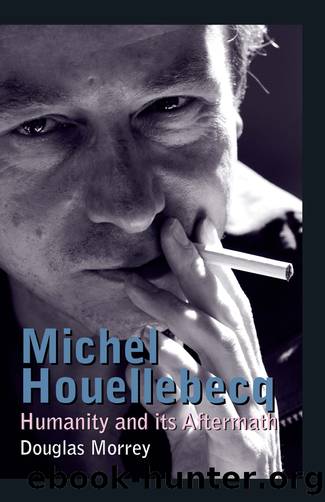Michel Houellebecq by Morrey Douglas;

Author:Morrey, Douglas;
Language: eng
Format: epub
Publisher: Liverpool University Press
CHAPTER THREE
Science and Religion
This chapter seeks to reconstruct the understanding of ‘life’, and human life in particular, that characterises Houellebecq’s work and that, in La Possibilité d’une île (2005), is finally seen to necessitate humanity’s overcoming by a posthuman successor species. In doing so the chapter returns to Houellebecq’s earliest works and notes Houellebecq’s apparent identification with H. P. Lovecraft, the American author of horror fiction whose writing is marked by a hatred of life and for whom literature appears as a rejection of or opposition to life. This sense is confirmed in Rester vivant (1991), which stresses failure and suffering as the poet’s vocation. Significant, too, is Houellebecq’s repeated appeal to the philosophy of Arthur Schopenhauer who equally describes life as a domain of struggle, suffering and disappointment for which the only possible solution is a suppression or rejection of individual will. La Possibilité d’une île also stresses the disappointment of life, especially in the context of a hedonistic culture that devalues maturity and dismisses the elderly, thereby leading to an increasing restriction of the viable life course. This view of life tends to imply a somewhat old-fashioned and simplistic social Darwinism, yet the future Utopia of La Possibilité d’une île, in which humanity engineers its own overcoming, suggests a far more complex and paradoxical view of evolution and the novel can be seen as an attempt to think the unthinkable; that is to say, what kind of shape would be taken by the life of a future species for which our own systems of value and modes of understanding the world had ceased to be meaningful? Finally, this chapter closes on an interrogation of the ambiguous role of religion in Houellebecq’s work. His novels contain reasonably extensive reference to religious ideas, traditions and practices, yet are couched in an uncertain, shifting tone that often makes these markers of faith appear incongruous or ironic. Nonetheless there is fairly clear evidence of some residual respect in Houellebecq’s work for religious faith or commitment and a sense of the persistence of religious models over our thinking and behaviour. This can be seen, too, in his treatment of religious cults which is gently ironic but never entirely facetious or condemnatory. Religious discourse remains valuable in two domains especially: it continues to allow for a belief in selfless love in a culture where this value has been largely replaced by narcissistic eroticism; and it helps us to think through the moral implications of the scientifically facilitated elongation or replication of life that may shortly be within our grasp. Lastly, religious thought remains one of the few domains in our society that points to the benefits to be accrued from a renouncing of desire, something that has become anathema to the ruling ideology of consumer democracy.
Life: Houellebecq, Lovecraft, Schopenhauer
Michel Houellebecq’s first published work (in 1991) was his short, and relatively little-discussed, study of the American horror writer H. P. Lovecraft. If the work has drawn scant commentary, it is doubtless because readers are uncertain
Download
This site does not store any files on its server. We only index and link to content provided by other sites. Please contact the content providers to delete copyright contents if any and email us, we'll remove relevant links or contents immediately.
The Fine Print (Dreamland Billionaires Book 1) by Lauren Asher(2548)
Fury of Magnus by Graham McNeill(2436)
The Last House on Needless Street by Catriona Ward(2380)
The Rose Code by Kate Quinn(2189)
A Little Life: A Novel by Hanya Yanagihara(2096)
Malibu Rising by Taylor Jenkins Reid(1902)
The God of the Woods by Liz Moore(1895)
Luster by Raven Leilani(1894)
Transcendent Kingdom by Yaa Gyasi(1845)
Moonflower Murders by Anthony Horowitz(1839)
The Lost Book of the White (The Eldest Curses) by Cassandra Clare & Wesley Chu(1681)
This Changes Everything by Unknown(1499)
The Midwife Murders by James Patterson & Richard Dilallo(1475)
The New Wilderness by Diane Cook(1435)
The Lying Life of Adults by Elena Ferrante(1425)
Wandering in Strange Lands by Morgan Jerkins(1406)
Written in the Stars by Alexandria Bellefleur(1391)
Ambition and Desire: The Dangerous Life of Josephine Bonaparte by Kate Williams(1380)
The Lying Life of Adults by Elena Ferrante;(1302)
